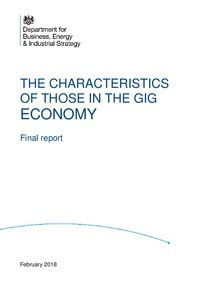The characteristics of individuals in the gig economy
"This report presents the findings from research conducted into the gig economy for the Department for Business, Energy & Industrial Strategy (BEIS). The research had three key aims: • To develop a working definition of the gig economy; • To provide a robust estimate of the number of indivi...
| Main Authors: | , , , |
|---|---|
| Institution: | ETUI-European Trade Union Institute |
| Format: | TEXT |
| Language: | English |
| Published: |
London
2018
Crown |
| Subjects: | |
| Online Access: | https://www.labourline.org/KENTIKA-19399518124911177909-The-characteristics-of-individ.htm |
| Summary: | "This report presents the findings from research conducted into the gig economy for the Department for Business, Energy & Industrial Strategy (BEIS). The research had three key aims: • To develop a working definition of the gig economy; • To provide a robust estimate of the number of individuals who have found work via the gig economy; and • To provide detailed information on the characteristics of those who work in the gig economy. There is no single, agreed definition of the gig economy. Based on inclusion and exclusion criteria, a working definition of the gig economy was created in consultation with BEIS and the Institute for Employment Studies. For this research, the working definition is: “The gig economy involves the exchange of labour for money between individuals or companies via digital platforms that actively facilitate matching between providers and customers, on a short-term and payment by task basis.” A quantitative research design was used to estimate the scale of the gig economy and the characteristics of those working in the gig economy. NatCen used two survey vehicles: the NatCen Panel and YouGov Omnibus survey. The NatCen Panel, a probability-based online survey of 2,184 individuals in Britain, was used to provide a prevalence estimate of the number of people involved in the gig economy. The NatCen Panel is based on a random probability sample of respondents in Britain, (which does not include Northern Ireland). Panel members were recruited through the British Social Attitudes survey whose participants were selected at random. Unlike most online panels, the NatCen Panel is not based on an opt-in approach, which means it is a better reflection of the population. Panel members are first invited to participate online, and those who have not taken part are then contacted by telephone. In this way, the Panel is also inclusive of groups who typically suffer from digital exclusion. While the Panel provides the best possible indication of the scale of the gig economy, the relatively small size of the panel and proportion of people in the gig economy limits the amount of sub-group analysis possible. Therefore, to understand the characteristics and work practices of those involved in the gig economy in more detail the YouGov Omnibus, a non-probability online panel survey (conducted over five waves) of 11,354 people was used. This quantitative research focused on individuals in Great Britain. The fieldwork was carried out between July and August 2017 and therefore represents a one-off estimate of the scale of the gig economy in that period of time. |
|---|---|
| Physical Description: | 47 p. Digital |

